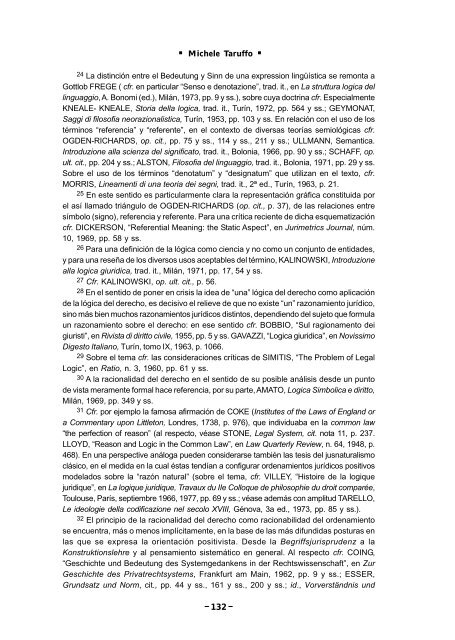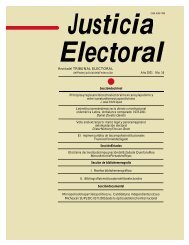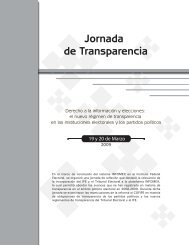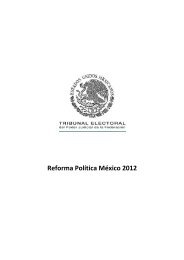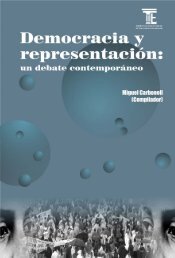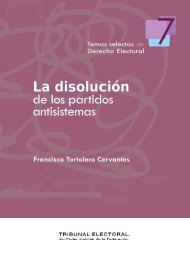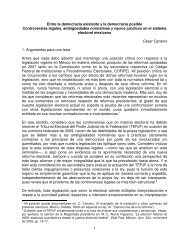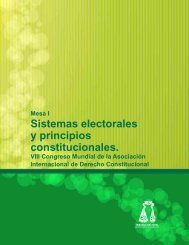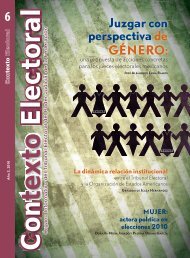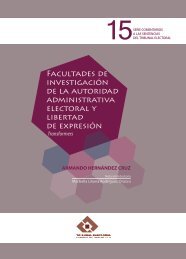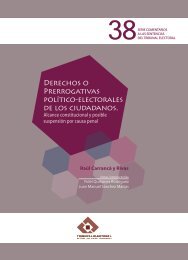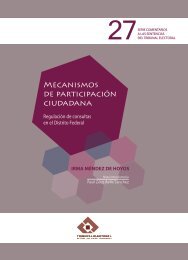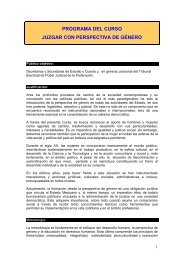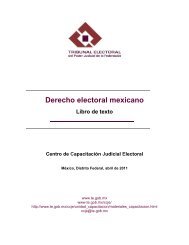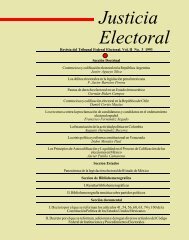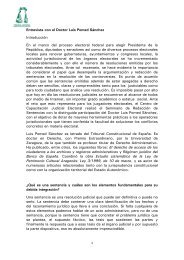La Motivación de la Sentencia Civil - Tribunal Electoral del Poder ...
La Motivación de la Sentencia Civil - Tribunal Electoral del Poder ...
La Motivación de la Sentencia Civil - Tribunal Electoral del Poder ...
You also want an ePaper? Increase the reach of your titles
YUMPU automatically turns print PDFs into web optimized ePapers that Google loves.
Michele Taruffo<br />
24 <strong>La</strong> distinción entre el Be<strong>de</strong>utung y Sinn <strong>de</strong> una expression lingüística se remonta a<br />
Gottlob FREGE ( cfr. en particu<strong>la</strong>r “Senso e <strong>de</strong>notazione”, trad. it., en <strong>La</strong> struttura logica <strong>de</strong>l<br />
linguaggio, A. Bonomi (ed.), Milán, 1973, pp. 9 y ss.), sobre cuya doctrina cfr. Especialmente<br />
KNEALE- KNEALE, Storia <strong>de</strong>l<strong>la</strong> logica, trad. it., Turín, 1972, pp. 564 y ss.; GEYMONAT,<br />
Saggi di filosofia neorazionalistica, Turín, 1953, pp. 103 y ss. En re<strong>la</strong>ción con el uso <strong>de</strong> los<br />
términos “referencia” y “referente”, en el contexto <strong>de</strong> diversas teorías semiológicas cfr.<br />
OGDEN-RICHARDS, op. cit., pp. 75 y ss., 114 y ss., 211 y ss.; ULLMANN, Semantica.<br />
Introduzione al<strong>la</strong> scienza <strong>de</strong>l significato, trad. it., Bolonia, 1966, pp. 90 y ss.; SCHAFF, op.<br />
ult. cit., pp. 204 y ss.; ALSTON, Filosofia <strong>de</strong>l linguaggio, trad. it., Bolonia, 1971, pp. 29 y ss.<br />
Sobre el uso <strong>de</strong> los términos “<strong>de</strong>notatum” y “<strong>de</strong>signatum” que utilizan en el texto, cfr.<br />
MORRIS, Lineamenti di una teoria <strong>de</strong>i segni, trad. it., 2ª ed., Turín, 1963, p. 21.<br />
25 En este sentido es particu<strong>la</strong>rmente c<strong>la</strong>ra <strong>la</strong> representación gráfica constituida por<br />
el así l<strong>la</strong>mado triángulo <strong>de</strong> OGDEN-RICHARDS (op. cit., p. 37), <strong>de</strong> <strong>la</strong>s re<strong>la</strong>ciones entre<br />
símbolo (signo), referencia y referente. Para una crítica reciente <strong>de</strong> dicha esquematización<br />
cfr. DICKERSON, “Referential Meaning: the Static Aspect”, en Jurimetrics Journal, núm.<br />
10, 1969, pp. 58 y ss.<br />
26 Para una <strong>de</strong>finición <strong>de</strong> <strong>la</strong> lógica como ciencia y no como un conjunto <strong>de</strong> entida<strong>de</strong>s,<br />
y para una reseña <strong>de</strong> los diversos usos aceptables <strong>de</strong>l término, KALINOWSKI, Introduzione<br />
al<strong>la</strong> logica giuridica, trad. it., Milán, 1971, pp. 17, 54 y ss.<br />
27 Cfr. KALINOWSKI, op. ult. cit., p. 56.<br />
28 En el sentido <strong>de</strong> poner en crisis <strong>la</strong> i<strong>de</strong>a <strong>de</strong> “una” lógica <strong>de</strong>l <strong>de</strong>recho como aplicación<br />
<strong>de</strong> <strong>la</strong> lógica <strong>de</strong>l <strong>de</strong>recho, es <strong>de</strong>cisivo el relieve <strong>de</strong> que no existe “un” razonamiento jurídico,<br />
sino más bien muchos razonamientos jurídicos distintos, <strong>de</strong>pendiendo <strong>de</strong>l sujeto que formu<strong>la</strong><br />
un razonamiento sobre el <strong>de</strong>recho: en ese sentido cfr. BOBBIO, “Sul ragionamento <strong>de</strong>i<br />
giuristi”, en Rivista di diritto civile, 1955, pp. 5 y ss. GAVAZZI, “Logica giuridica”, en Novissimo<br />
Digesto Italiano, Turín, tomo IX, 1963, p. 1066.<br />
29 Sobre el tema cfr. <strong>la</strong>s consi<strong>de</strong>raciones críticas <strong>de</strong> SIMITIS, “The Problem of Legal<br />
Logic”, en Ratio, n. 3, 1960, pp. 61 y ss.<br />
30 A <strong>la</strong> racionalidad <strong>de</strong>l <strong>de</strong>recho en el sentido <strong>de</strong> su posible análisis <strong>de</strong>s<strong>de</strong> un punto<br />
<strong>de</strong> vista meramente formal hace referencia, por su parte, AMATO, Logica Simbolica e diritto,<br />
Milán, 1969, pp. 349 y ss.<br />
31 Cfr. por ejemplo <strong>la</strong> famosa afirmación <strong>de</strong> COKE (Institutes of the <strong>La</strong>ws of Eng<strong>la</strong>nd or<br />
a Commentary upon Littleton, Londres, 1738, p. 976), que individuaba en <strong>la</strong> common <strong>la</strong>w<br />
“the perfection of reason” (al respecto, véase STONE, Legal System, cit. nota 11, p. 237.<br />
LLOYD, “Reason and Logic in the Common <strong>La</strong>w”, en <strong>La</strong>w Quarterly Review, n. 64, 1948, p.<br />
468). En una perspective análoga pue<strong>de</strong>n consi<strong>de</strong>rarse también <strong>la</strong>s tesis <strong>de</strong>l jusnaturalismo<br />
clásico, en el medida en <strong>la</strong> cual éstas tendían a configurar or<strong>de</strong>namientos jurídicos positivos<br />
mo<strong>de</strong><strong>la</strong>dos sobre <strong>la</strong> “razón natural” (sobre el tema, cfr. VILLEY, “Histoire <strong>de</strong> <strong>la</strong> logique<br />
juridique”, en <strong>La</strong> logique juridique, Travaux du IIe Colloque <strong>de</strong> philosophie du droit comparée,<br />
Toulouse, París, septiembre 1966, 1977, pp. 69 y ss.; véase a<strong>de</strong>más con amplitud TARELLO,<br />
Le i<strong>de</strong>ologie <strong>de</strong>l<strong>la</strong> codificazione nel secolo XVIII, Génova, 3a ed., 1973, pp. 85 y ss.).<br />
32 El principio <strong>de</strong> <strong>la</strong> racionalidad <strong>de</strong>l <strong>de</strong>recho como racionabilidad <strong>de</strong>l or<strong>de</strong>namiento<br />
se encuentra, más o menos implícitamente, en <strong>la</strong> base <strong>de</strong> <strong>la</strong>s más difundidas posturas en<br />
<strong>la</strong>s que se expresa <strong>la</strong> orientación positivista. Des<strong>de</strong> <strong>la</strong> Begriffsjurispru<strong>de</strong>nz a <strong>la</strong><br />
Konstruktionslehre y al pensamiento sistemático en general. Al respecto cfr. COING,<br />
“Geschichte und Be<strong>de</strong>utung <strong>de</strong>s Systemgedankens in <strong>de</strong>r Rechtswissenschaft”, en Zur<br />
Geschichte <strong>de</strong>s Privatrechtsystems, Frankfurt am Main, 1962, pp. 9 y ss.; ESSER,<br />
Grundsatz und Norm, cit., pp. 44 y ss., 161 y ss., 200 y ss.; id., Vorverständnis und<br />
132


